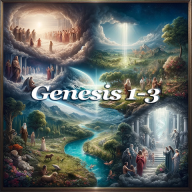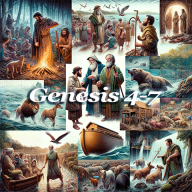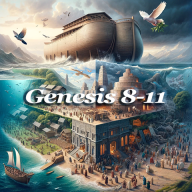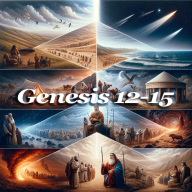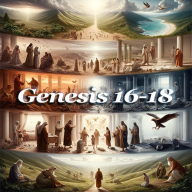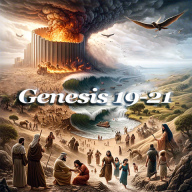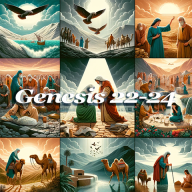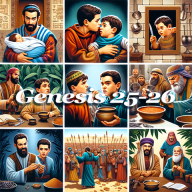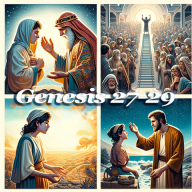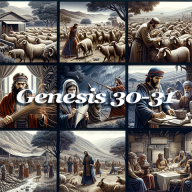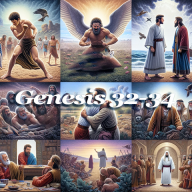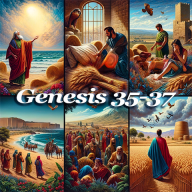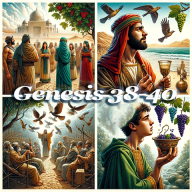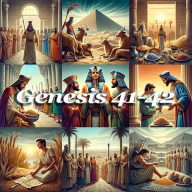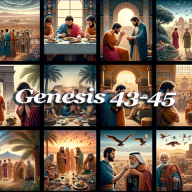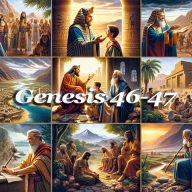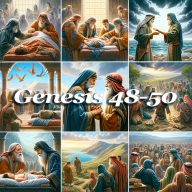
The Book of Genesis, the first book of the Hebrew Bible and the Old Testament, serves as the foundational narrative of the Jewish, Christian, and Islamic traditions. Its name, "Genesis," derives from the Greek translation of the Hebrew word "בְּרֵאשִת" (B'reshit or Bereshit), meaning "in the beginning," which are also the opening words of the text. This title reflects the book's themes of creation, origin, and beginnings (Hamilton, 1990).
Traditionally, Genesis has been ascribed to Moses as part of the Pentateuch, the first five books of the Bible. However, modern scholarship often attributes its composition to multiple authors over several centuries, a theory known as the Documentary Hypothesis. This hypothesis suggests that Genesis was compiled from various sources, including the Jahwist (J), Elohist (E), Priestly (P), and Deuteronomist (D) texts, during a period spanning from the 10th to the 5th centuries BCE. These sources were likely compiled during or after the Babylonian Exile, suggesting a final form of Genesis around the 5th century BCE (Friedman, 1987).
The purpose of Genesis is manifold, aiming to explain the origins of the world, humanity, and the Hebrew people. It lays the foundation for the covenantal relationship between God and Abraham's descendants, establishing themes of promise, faith, and obedience. Genesis also addresses universal questions of human existence, including the nature of good and evil, human responsibility, and the dynamics of family and society.
Structurally, Genesis can be divided into two main parts: the Primeval History (chapters 1-11) and the Patriarchal Narratives (chapters 12-50). The Primeval History covers the creation of the world, Adam and Eve, the Flood, and the Tower of Babel, setting up themes of sin, judgment, and grace. The Patriarchal Narratives focus on the lives of the patriarchs Abraham, Isaac, Jacob, and Joseph, emphasizing themes of covenant, faith, and providence.
The significance of Genesis lies in its foundational role in Judaism, Christianity, and Islam. It provides a cosmological and theological framework for understanding the world and humanity's place within it and offers profound insights into human nature, ethics, and the nature of God. Genesis has influenced countless cultural, literary, and philosophical traditions, making it one of religious literature's most significant and enduring works (Sarna, 1989).
References:
Friedman, R. E. (1987). Who Wrote the Bible? Harper & Row.
Hamilton, V. P. (1990). The Book of Genesis, Chapters 1-17. Eerdmans.
Sarna, N. M. (1989). The Genesis of Genesis. Biblical Archaeology Review.
 Genesis begins with the majestic account of God creating the universe, Earth, and all its inhabitants. These initial chapters (1-2) emphasize God's power, intentionality, and the inherent order He instills in the cosmos. Humanity is introduced as the pinnacle of creation, made in God's image and given dominion over the Earth. The theme underscores the idea that the universe is not a product of chance but of divine design and purpose.
Genesis begins with the majestic account of God creating the universe, Earth, and all its inhabitants. These initial chapters (1-2) emphasize God's power, intentionality, and the inherent order He instills in the cosmos. Humanity is introduced as the pinnacle of creation, made in God's image and given dominion over the Earth. The theme underscores the idea that the universe is not a product of chance but of divine design and purpose.
 The narrative of Adam and Eve in the Garden of Eden (Chapter 3) introduces the concept of sin and disobedience against God's command. This act of rebellion not only disrupts the relationship between humanity and God but also results in consequences that permeate through subsequent generations. Stories like Cain's murder of Abel and the wickedness that leads to the Great Flood further explore the destructive nature of sin.
The narrative of Adam and Eve in the Garden of Eden (Chapter 3) introduces the concept of sin and disobedience against God's command. This act of rebellion not only disrupts the relationship between humanity and God but also results in consequences that permeate through subsequent generations. Stories like Cain's murder of Abel and the wickedness that leads to the Great Flood further explore the destructive nature of sin.
 Central to Genesis is the theme of covenant – a binding agreement between God and humanity. God establishes covenants with Noah (post-Flood), Abraham (promising him numerous descendants and the land of Canaan), and Jacob. These covenants demonstrate God's enduring commitment to humanity and His specific plan for the lineage of Abraham.
Central to Genesis is the theme of covenant – a binding agreement between God and humanity. God establishes covenants with Noah (post-Flood), Abraham (promising him numerous descendants and the land of Canaan), and Jacob. These covenants demonstrate God's enduring commitment to humanity and His specific plan for the lineage of Abraham.
 Throughout Genesis, there's a recurring affirmation of God's sovereignty. Even in situations that seem bleak or where human characters falter, God's providential plan is at work. Joseph's statement to his brothers, "You intended to harm me, but God intended it for good," (Genesis 50:20) encapsulates this theme, suggesting an overarching divine narrative amidst human actions.
Throughout Genesis, there's a recurring affirmation of God's sovereignty. Even in situations that seem bleak or where human characters falter, God's providential plan is at work. Joseph's statement to his brothers, "You intended to harm me, but God intended it for good," (Genesis 50:20) encapsulates this theme, suggesting an overarching divine narrative amidst human actions.
 Genesis delves deeply into the dynamics of family, presenting both its blessings and complexities. From the first family of Adam and Eve to the detailed accounts of the patriarchs and their households, relationships are central. Themes of sibling rivalry (Cain and Abel, Jacob and Esau, Joseph and his brothers), marital struggles (Abraham and Sarah, Isaac and Rebekah, Jacob, Leah, and Rachel), and intergenerational blessings and conflicts shape the narrative.
Genesis delves deeply into the dynamics of family, presenting both its blessings and complexities. From the first family of Adam and Eve to the detailed accounts of the patriarchs and their households, relationships are central. Themes of sibling rivalry (Cain and Abel, Jacob and Esau, Joseph and his brothers), marital struggles (Abraham and Sarah, Isaac and Rebekah, Jacob, Leah, and Rachel), and intergenerational blessings and conflicts shape the narrative.
 The patriarchs, especially Abraham, exemplify faith and trust in God. Abraham's willingness to leave his homeland and later, his readiness to sacrifice Isaac, his son, are testaments to profound faith. This theme underscores the idea that, even amidst uncertainties, trusting in God's promises yields blessings.
The patriarchs, especially Abraham, exemplify faith and trust in God. Abraham's willingness to leave his homeland and later, his readiness to sacrifice Isaac, his son, are testaments to profound faith. This theme underscores the idea that, even amidst uncertainties, trusting in God's promises yields blessings.

 Genesis starts with a sweeping account of God's creation. Over six days, God brings the universe into existence, culminating in His creation of humanity in His own image. This act sets the stage for the narrative, emphasizing both the majesty of God and the special place of humans in the created order.
Genesis starts with a sweeping account of God's creation. Over six days, God brings the universe into existence, culminating in His creation of humanity in His own image. This act sets the stage for the narrative, emphasizing both the majesty of God and the special place of humans in the created order.
 The narrative of Adam and Eve in the Garden of Eden (Chapter 3) introduces the concept of sin and disobedience against God's command. This act of rebellion not only disrupts the relationship between humanity and God but also results in consequences that permeate through subsequent generations. Stories like Cain's murder of Abel and the wickedness that leads to the Great Flood further explore the destructive nature of sin.
The narrative of Adam and Eve in the Garden of Eden (Chapter 3) introduces the concept of sin and disobedience against God's command. This act of rebellion not only disrupts the relationship between humanity and God but also results in consequences that permeate through subsequent generations. Stories like Cain's murder of Abel and the wickedness that leads to the Great Flood further explore the destructive nature of sin.
 Central to Genesis is the theme of covenant – a binding agreement between God and humanity. God establishes covenants with Noah (post-Flood), Abraham (promising him numerous descendants and the land of Canaan), and Jacob. These covenants demonstrate God's enduring commitment to humanity and His specific plan for the lineage of Abraham.
Central to Genesis is the theme of covenant – a binding agreement between God and humanity. God establishes covenants with Noah (post-Flood), Abraham (promising him numerous descendants and the land of Canaan), and Jacob. These covenants demonstrate God's enduring commitment to humanity and His specific plan for the lineage of Abraham.
 God calls Abram (later renamed Abraham) from his homeland, promising to make him the father of a great nation. Despite challenges, including periods of doubt, old age, and even a command to sacrifice his son Isaac, Abraham's faith remains steadfast. His relationship with God establishes the foundation for the Israelite nation and God's covenantal relationship with them.
God calls Abram (later renamed Abraham) from his homeland, promising to make him the father of a great nation. Despite challenges, including periods of doubt, old age, and even a command to sacrifice his son Isaac, Abraham's faith remains steadfast. His relationship with God establishes the foundation for the Israelite nation and God's covenantal relationship with them.
 The narrative progresses through Abraham's descendants, focusing on key figures like Isaac, Jacob (later renamed Israel), and Jacob's twelve sons. These stories, filled with both divine encounters and human drama, trace the formation of the twelve tribes of Israel.
The narrative progresses through Abraham's descendants, focusing on key figures like Isaac, Jacob (later renamed Israel), and Jacob's twelve sons. These stories, filled with both divine encounters and human drama, trace the formation of the twelve tribes of Israel.
 One of Jacob's sons, Joseph, becomes the central character in the concluding chapters of Genesis. Betrayed by his brothers and sold into slavery in Egypt, Joseph's life is marked by a series of misfortunes and successes. Through divine providence, he rises to power in Egypt, ultimately saving the region from famine and reconciling with his family. His journey bridges the narrative gap between Canaan and Egypt, setting the stage for the subsequent Exodus story.
One of Jacob's sons, Joseph, becomes the central character in the concluding chapters of Genesis. Betrayed by his brothers and sold into slavery in Egypt, Joseph's life is marked by a series of misfortunes and successes. Through divine providence, he rises to power in Egypt, ultimately saving the region from famine and reconciling with his family. His journey bridges the narrative gap between Canaan and Egypt, setting the stage for the subsequent Exodus story.

